Related Research Articles

Dayanand Saraswati, also known as Maharshi Dayanand, was an Indian philosopher, social leader and founder of the Arya Samaj, a reform movement of the Vedic dharma. His magnum opus is the book Satyarth Prakash, which has remained a highly influential text on the philosophy of the Vedas and clarifications of various ideas and duties of human beings. He was the first to give the call for Swaraj as "India for Indians" in 1876, a call later taken up by Lokmanya Tilak. Denouncing the idolatry and ritualistic worship, he worked towards reviving Vedic ideologies. Subsequently, the philosopher and President of India, S. Radhakrishnan, called him one of the "makers of Modern India", as did Sri Aurobindo.
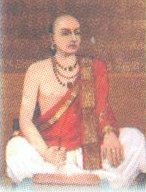
Nannaya Bhattaraka was a Telugu poet and the author of Andhra Mahabharatam, a Telugu retelling of the Sanskrit-language Mahabharata. Nannaya is generally considered the first poet of Telugu language. He was patronized by Rajaraja Narendra of Rajamahendravaram. Rajaraja Narendra was an admirer of Mahabharata and wanted the message of the Sanskrit epic to reach the Telugu masses in their own language and idiom. He commissioned Nannaya, a scholar well versed in Vedas, Puranas, and Itihasas for the task. Nannaya began his work in c. 1025 CE and wrote Adi Parvam, Sabaparvam, and a part of Aranyaparvam and passed away.
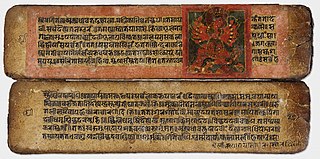
Sanskrit literature broadly comprises all literature in the Sanskrit language. This includes texts composed in the earliest attested descendant of the Proto-Indo-Aryan language known as Vedic Sanskrit, texts in Classical Sanskrit as well as some mixed and non-standard forms of Sanskrit. Literature in the older language begins with the composition of the Ṛg·veda between about 1500 and 1000 BCE, followed by other Vedic works right up to the time of the grammarian Pāṇini around 6th or 4th century BCE.

Kannada literature is the corpus of written forms of the Kannada language, a member of the Dravidian family spoken mainly in the Indian state of Karnataka and written in the Kannada script.

Roberto de Nobili was an Italian Jesuit missionary to Southern India. He used a novel method of adaptation (accommodatio) to preach Christianity, adopting many local customs of India which were, in his view, not contrary to Christianity.

Alain Daniélou was a French historian, Indologist, intellectual, musicologist, translator, writer, and notable Western convert to and expert on the Shaivite sect of Hinduism.

Gujarati Sahitya Parishad is a literary organisation for the promotion of Gujarati literature located in Ahmedabad, Gujarat, India. It was founded by Ranjitram Mehta with the aim of creating literature appealing to all classes of society and cultivating a literary sense among the people. Many prominent people including Mahatma Gandhi and Kanaiyalal Munshi have presided over the organisation. Its headquarters, located on Ashram Road, is known as Govardhan Bhavan. It has a conference hall and library.
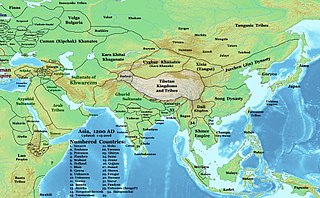
Hoysala literature is the large body of literature in the Kannada and Sanskrit languages produced by the Hoysala Empire (1025–1343) in what is now southern India. The empire was established by Nripa Kama II, came into political prominence during the rule of King Vishnuvardhana (1108–1152), and declined gradually after its defeat by the Khalji dynasty invaders in 1311.
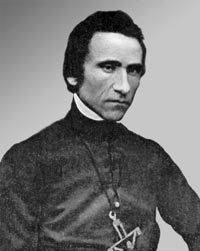
Jean-Nicolas Laverlochère was a French missionary in Canada. He began his religious life as a lay brother in the Congregation of the Oblates, but feeling called to evangelize the natives of Canada, he was allowed to study for the priesthood, and was ordained on May 5, 1844 at L'Acadie, near Montreal. He was a missionary in the Saguenay district from 1844 to 1847, at Abitibi, Moose Factory, and other posts on Hudson Bay from 1847 to 1863, at Plattsburgh, New York from 1863 to 1868, and on Lake Timiskaming from 1868 to his death in 1884. He laboured for the conversion of the native tribes. His reputation as a zealous missionary spread throughout Catholic Europe to such an extent that he was ultimately recognized as the Apostle of Hudson Bay. A stroke of palsy interrupted his labours in the course of 1851. He died in 1884 and is buried in the Catholic cemetery in Fort-Témiscamingue.
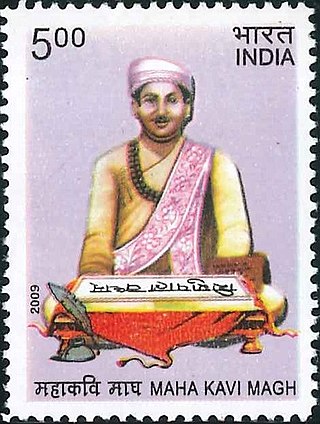
Magha was a Sanskrit poet at King Varmalata's court at Shrimala, the then-capital of Gujarat. Magha was born in a Shrimali Brahmin family. He was the son of Dattaka Sarvacharya and the grandson of Suprabhadeva. His epic poem (mahākāvya) Shishupala Vadha, in 20 sargas (cantos), is based on the Mahabharata episode in which Krishna uses his chakra (disc) to behead the defiant king Shishupala. He is thought to have been inspired by, and is often compared with, Bharavi.

Mysore literature in Kannada is a body of literature composed in the Kannada language in the historical Kingdom of Mysore in Southern India and written in the Kannada script. The writings date from the Kingdom of Mysore, which existed from around 1600 CE until the establishment of modern India in 1947. Many of the works of this literature written on religious themes are labeled Veerashaiva or Vaishnava in acknowledgment of the two faiths that gave form to the literature and fostered it until the advent of the modern era. Despite a gradual decline in the popularity of Jainism, authors devoted to the faith produced some works of merit. Secular themes dealing with a wide range of subjects were also written on. Kannada literature flourished for a short while in the court of the neighbouring kingdom of the Nayakas of Keladi whose territory was annexed by Mysore in 1763.

Jagannatha Dasa (1728–1809), a native of Manvi town in the Raichur district, Karnataka state, India, comes in the preceptorial line of Madhvacharya and is considered one of the notable Haridasa of Dvaita Vedanta of Madhva saint-poets of the Kannada language. Apart from authoring numerous well-known devotional songs that propagate the Vaishnava bhakti ("faith") of Dvaita Vedanta of Madhvacharya, Jagannatha Dasa wrote the Harikathamritasara in the native shatpadi metre and Tattva suvali in the native tripadi metre. He was also an accomplished scholar in the Sanskrit language.
Dr. Om Prakash Pandey, is a poet who won the Sahitya Akademi Award for Sanskrit in 2008.
Doha is a lyrical verse-format which was extensively used by Indian poets and bards of North India probably since the beginning of the 6th century AD. Dohas of Kabir, Tulsidas, Raskhan, Rahim and the dohas of Nanak called Sakhis are famous. Satasai of Hindi poet, Bihārī, contains many dohas. Dohas are written even now.
A subhashita is a literary genre of Sanskrit epigrammatic poems and their message is an aphorism, maxim, advice, fact, truth, lesson or riddle. Su in Sanskrit means good; bhashita means spoken; which together literally means well spoken or eloquent saying.
Shree Somnath Sanskrit University (SSSU) is a public university located in Gujarat, India. It was created by the Gujarat State government through the Shree Somnath Sanskrit University Act in 2005 for the research and teaching of Sanskrit literature, with objectives to preserve India’s cultural and linguistic heritage. The main campus in Veraval is home to seven departments, or faculties, which, together with 110 affiliated colleges, research institutes, and centers across Gujarat, award nine different degrees, including B.A., M.A., and PhD, in a variety of fields. Shree Somnath Sanskrit University publishes a quarterly research publication, Somajyoti, and organize regular workshops and conferences to promote discourse and research in Sanskrit language and culture.

Harish Krishnaram Dave, better known by his pen name Harish Meenashru, is a Gujarati language poet and translator from Gujarat, India. He is best known as a postmodern poet in Gujarati literature. Some of his significant works include Dhribaangsundar Eni Pere Dolya (1988), Suno Bhai Sadho (1999), Tandul (1999), Parjanyasukta (1999), and Banaras Diary (2016). His poems have been translated in Hindi, Marathi, Malayalam, Kannada, German, and English. He received a Kalapi Award (2010), Vali Gujarati Gazal Award (2012), and Narsinh Mehta Award (2014). He received the 2020 Sahitya Akademi Award for his poetry collection Banaras Diary (2016).
Rasiklal Chhotalal Parikh (1897–1982) was a 20th-century Gujarati poet, playwright, literary critic, Indologist, historian, and editor from Gujarat, India. He was the president of Gujarat Sahitya Sabha and was appointed the president of Gujarati Sahitya Parishad in 1964. He received the Sahitya Akademi Award in 1960 for his play Sharvilak. He is also a recipient of the Ranjitram Suvarna Chandrak and the Narmad Suvarna Chandrak.
References
- ↑ Rocher, Ludo (1984). Ezourvedam: A French Veda of the Eighteenth Century (in French). John Benjamins Publishing. ISBN 978-0-915027-06-4.
- ↑ "Publications of Jean Calmette".